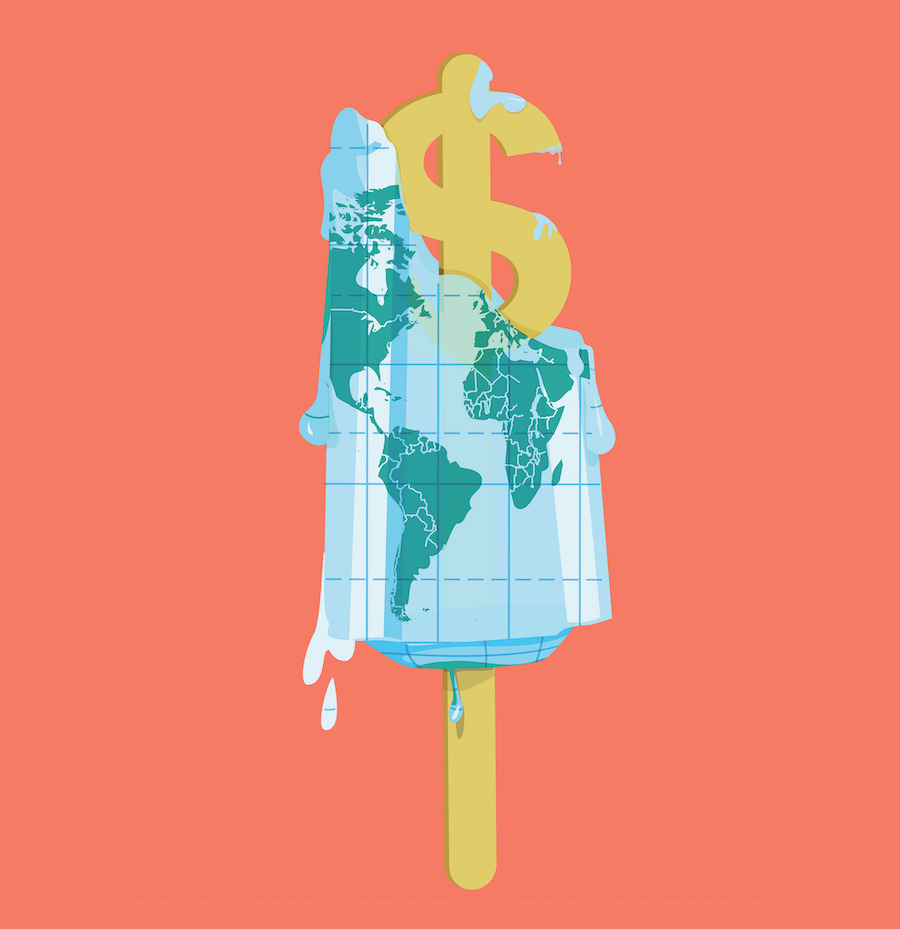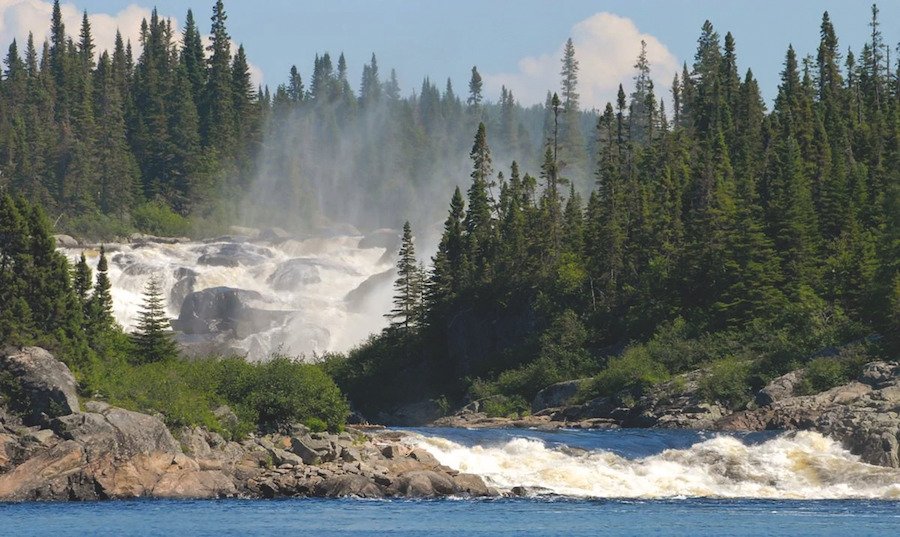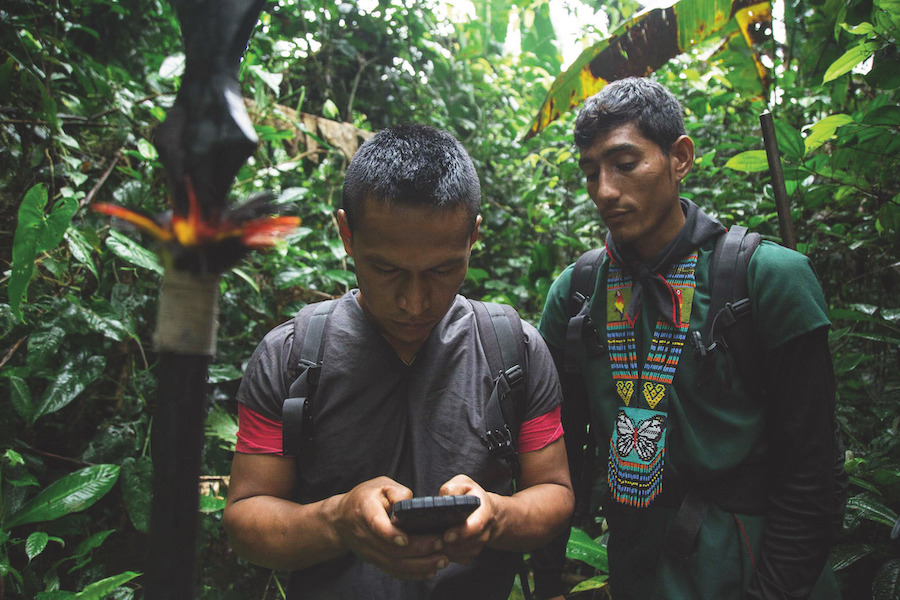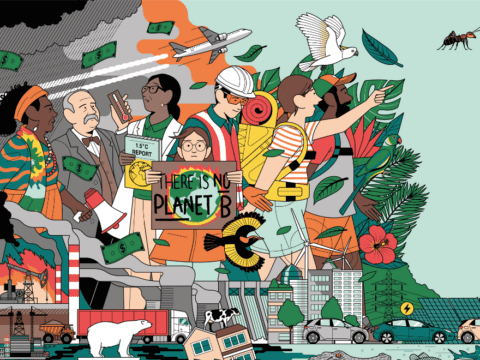A few years ago, in university, I knew a communist who was convinced the only thing that could stop the inevitable revolution of the poor against the rich was climate change wiping out humanity. Like many of his beliefs, this seemed a little far-fetched to me. I mean, that particular revolution might never happen. And while the climate crisis will be deadly for billions if left unchecked, most climate scientists feel our species will survive.
Yet as the planet continues to deteriorate, climate activists are finding more common cause with my revolutionary friend than they might care to admit. While many would part ways on the topic of communism, both camps see unbridled capitalism as a threat to humanity. Both assert that economic justice for all is key to our collective survival.
But what, exactly, are the links between capitalism and climate disruption? I started looking at the research and was surprised. This modern brand of anti-capitalism doesn’t necessarily embrace the Marxist or communist call to abolish capitalism. It only requires believers to be critical of consumerism and Big Oil.
“To mainstream commerce, the Earth is both loot and dump,” the British environmentalist George Monbiot wrote in his book Out of the Wreckage. “Commercial activity, broadly speaking, consists of extracting resources from a hole in the ground on one side of the planet, inducing people to buy them, then dumping them a few days later in a hole in the ground on the other side.”
As well, many concrete climate solutions follow from an anti-capitalist approach to climate change — all surprisingly hope-inducing at a time when meaningful action is stalling.
Which raises the question: Are we missing out on important ideas because we assume these schools of thought are fringe, boring or, worse, irrelevant?
You don’t need to have any particular politics to recognize that the climate crisis is overwhelmingly attributable to economic activity. A study in 2019 by the Colorado-based Climate Accountability Institute, for example, found that from the birth of industry in 1751 to 2017, the production and burning of products from just 103 fossil fuel companies was responsible for nearly 70 percent of all the greenhouse gas emissions.
From 1965 onward, once the whole planet had an endless hunger for energy, the activities and products of just 20 of those companies contributed a third of all emissions. They include Chevron, ExxonMobil, BP and the state-owned companies of Saudi Arabia, Russia, Iran and India, among others.
Once oil and coal are extracted, it is the rich who burn it the most. The Intergovernmental Panel on Climate Change, the team at the United Nations responsible for assessing scientific research on the matter, said in 2022 that households “with the highest per capita emissions contribute a disproportionately large share of [global household] emissions.”
How disproportionate? On a planet of eight billion people, the richest one percent contribute the same share of yearly emissions as the poorest two-thirds, according to the Stockholm Environment Institute. To help visualize those numbers, imagine the population of Germany emitting about as much carbon dioxide as the populations of North America, Europe and Asia combined. Billions of people use electricity, drive cars, cook with gas and buy tonnes of plastic products every year and still emit less than the number of people who watched the Super Bowl in 2023.
No matter what scale you look at, climate change is deeply tied to economic activity. Industry feeds it; consumers sustain it. The people most affected by the climate crisis are always the most dispossessed, whether we look at flooding island nations in the Pacific or Indigenous Peoples in the Amazon defending their land from logging companies. A lack of wealth or rights makes you vulnerable to the whims of the powerful. If you accept that premise, then you can’t say the problem is a few greedy companies operating in a few countries. It has to be systemic, and the only accurate label for that system is “capitalism.”

If you find that difficult to accept, you’re not alone. Right-wing politicians have increasingly begun referring to progressive policies they dislike as “authoritarian,” a word that recalls the Red Scare of the Cold War. This rhetoric is more prominent in the United States than in Canada, with 60 per- cent of Americans viewing socialism negatively, according to a 2022 Pew Research survey.
“We’re so used to capitalism that we don’t necessarily even know it when we see it,” says Emily Huddart Kennedy, a sociologist at the University of British Columbia who researches sustainable food movements.
She says many people find socialism and communism so unpalatable that the distaste can “short-circuit people’s ability to think thoughtfully and reflectively.” The reaction is so strong that she’s noticed some anti-capitalist campaigners have to avoid talking about their principles in order to mobilize more people. “One participant said, ‘If I start spewing off about capitalism and power and oppression, nobody’s going to listen to me.’”
This phenomenon isn’t entirely caused by simple bias. People also genuinely struggle to come up with concrete forms of climate action that don’t require a capitalist economy, Kennedy says. For example, trying to create an alternative food system is difficult without the capitalist constructs of land tenure rights and industry partners who have financing and supply chains. Devising feasible solutions and being an anti-capitalist seem to be mutually exclusive.
***
Even academic economists, who like to say that they are ideologically neutral, have trouble assessing anti-capitalist ideas without bias. Between 2017 and 2018, economists Mohsen Javdani of Simon Fraser University in Vancouver and HaJoon Chang of the School of Oriental and African Studies in London surveyed 2,425 economists around the world for ideological bias. Participants were presented with opinions from notable economist thinkers with the attributions jumbled up. Then they were asked whether they agreed with the opinions. In most cases, participants were more likely to agree with a statement when told it came from a mainstream thinker, like Adam Smith, than a less mainstream one, like Karl Marx.
Neither of the researchers is an outright Marxist, by the way. Chang believes in reforming the free market, not abolishing it. In his breezy book 23 Things They Don’t Tell You About Capitalism, published in 2010, he points to the rapid economic growth of East Asian countries like Taiwan and South Korea as an example of how capitalism can be a force for good.
In fact, it’s a philosopher-economist, Kohei Saito, of the University of Tokyo, who has attempted, as he puts it, to “resolve the tension between Red and Green.” His 2020 book, Capital in the Anthropocene, became a surprise hit in Japan. In early 2023, he released a sequel of sorts, Marx in the Anthropocene, that drew on notebooks Karl Marx kept in the last 15 years of his life. This was Saito’s first popular book in English, and reviews soon flooded in from the New York Times, the Guardian and other esteemed publications that seemed to be taking Saito seriously.
More on Broadview:
- How should we navigate the climate crisis?
- Canadian mining companies are destroying communities in the Philippines but this United Church mission team is determined to help
- Canada’s military emissions are standing in the way of its climate change commitments
At the heart of his analysis is Marx’s conclusion not just that wealth is produced by the many and hoarded by the few, but that nature itself is a casualty of capitalism. For example, in 1869, Marx documented his concern about the consequences of industrialized livestock rearing, driven by a growing appetite for meat. “It will not be long before the Irish farmer experiences that this system will end in the total exhaustion of the land,” he wrote.
In other words, Saito argues that capitalism and a healthy planet are intrinsically at odds. He even says that our individual lives are stunted because we’ve lost the joy that comes from engaging with nature. We seek fulfilment in “destructive, extravagant and wasteful products.”
The defenders of capitalism say there are no realistic alternatives. Capitalism has been the status quo since the steam engine. It has propelled billions out of poverty and enabled huge leaps in medicine and technology. Capitalism has given us longer, healthier, happier lives, with material comforts past generations couldn’t dream of.
It’s unclear whether a more centralized government would do any better, or whether the vestiges of capitalism would reassert income inequality in the long run. If we completely overhaul the system, could we live without the benefits it’s given us? Also unknown: under an anti-capitalist system, what happens to the rights we expect, like owning our homes, protecting our work with copyright and supporting our children with an inheritance?
Critics of capitalism are adamant that we have to open the discussion. And, being famously unconsolidated, the left has proposed multiple alternatives to the current system. Even within the climate movement there is a spectrum of thought, factions splitting at each new probe like Hydra heads.
***
Here’s a pop quiz. Which of these three environmental solutions is the best?
Number one: ecosocialism. It’s essentially socialism with a spicy climate kick. A larger government places more restrictions on private companies — higher carbon taxes, let’s say — and nationalizes any decision-making with profound environmental impacts. All oil could be government-owned and leased out as needed to make fuel. Private citizens could be restricted from buying land with any ecological value.
Second candidate: degrowth. A loose coalition of diverse viewpoints with one shared anchor, a conviction that economic growth cannot continue forever. Eventually, we will deplete so much of Earth’s natural resources that the planet will have nothing left to give. We need to stop — or at least greatly reduce — industrial activity before that happens. Saito, who believes degrowth is best aligned with Marx’s original position, says we must stop buying those destructive, extravagant and wasteful products. We lose some material luxuries, but now we can finally make decisions collectively for the health of the planet.
Last but not least: the circular economy. The free market continues to exist, but companies design their products to be recycled, repurposed and restored rather than replaced. Finite raw materials are reused instead of winding up in landfills. The demand for natural resources diminishes, reducing the power of extractive industries. We all work co-operatively to share our limited resources, which encourages democracy and community solidarity.
Spoiler alert: there is no right answer. It’s a trick question. The options overlap. A socialist economy isn’t immune to overproduction, so some limits on resource extraction are still needed. Degrowth can’t happen overnight — we’ll need to make the transition to reusing our existing stock of plastics and metals slowly. And mutual aid is never going to happen at scale without some kind of government enforcement.
But when you start pulling this thread, you find more camps than you thought possible. There are doughnut economists, eco-communists, eco-anarchists and many more. People within environmental movements exhibit a range of pro- and anti-capitalist ideologies, says Amy Janzwood, a political and environmental scientist at McGill University in Montreal. Among the oil pipeline protests she studies, she sees both NIMBY land owners who want their property values preserved and Indigenous land de- fenders fighting against colonial views of property.
“Regardless of the terminology we use, it’s incredibly important to think about the foundations that underpin what the future could look like,” Janzwood says. “If we don’t have a clear sense of the complex causes of the problems that we are currently wrestling with, then we won’t have a good idea of how to move beyond them.”
***
It’s easier to understand Janzwood’s point when you start looking at the component beliefs of each school of thought instead of considering them as a whole. The degrowth concern about rampant overproduction, for example, is convincing by itself.
Bengi Akbulut, an ecological economist and prominent degrowther at Concordia University, says she’s committed to it even if she has disagreements with more technical degrowth debates. In a 2020 paper she co-wrote, Akbulut argued that economics researchers should look at non-capitalist forms of economic activity if they want to advance climate action. She argued that these approaches are more democratic and take into account the fact that protecting nature can’t easily be assigned a dollar value — the same observation that Saito makes in his book.
“There is a reason why economic growth is so important under capitalism, but it displaces other principles, values or objectives we would like to build our economies around,” she says.
Last year’s controversial COP28 climate conference in the United Arab Emirates exemplifies her point. Environmentalists had already objected to the world’s largest climate talks being held in an oil-producing country. During the proceedings, they also alleged that the hosts hindered a new international action plan by removing all references to an eventual “phase out” of all new fossil fuel extraction.
In her paper, Akbulut argues the merits of a tweak on capitalism called “participatory planning.” It is a form of decision-making in business that could prevent companies from steamrolling over the people their industries affect and could also up- hold environmental values. Under this framework, large capital projects, like quarries, are supervised by a coalition of local citizens who are concerned about environmental impacts. These citizens are folded into the process and given influence just like shareholders and investors.
A mining project in Bolivia successfully used the model, according to a 2019 United Nations report. Beginning in 2000, a coalition that came to include local and regional governments, agricultural workers and women’s associations supervised the mine. Coalition representatives regularly tested water from nearby rivers because the mines acidified the water supply. In one case, they successfully lobbied a company to upgrade its facilities to reduce pollution.
Participatory planning can be implemented in different ways. It’s distinct from socialist central planning, Akbulut notes, because communities form coalitions from the ground up. On the other hand, the United Nations report suggested governments set up some rules for the mechanism to ensure that the community coalitions are independent of the companies they supervise.
It’s just one of the ways an anti-capitalist model of climate action opens the door to different possibilities, not all of them tethered to a larger political system. These ideas are often persuasive because they play on our values and emotions, sidestepping the morass of policy debates.
One of the most striking recent examples is the growing global interest in establishing environmental personhood, a legal argument that rests on granting nature the legal status of a person. Under both Canadian and international law, non-human entities can be “persons” if they have certain rights and obligations. A corporation might be a person if it’s obligated to treat its customers fairly, for example. Environmental personhood extends this line of thinking to features of the landscape, like rivers and mountains.

Many Indigenous Peoples around the world have long held similar beliefs. Sometimes these are spiritual or religious beliefs that differ from colonial ideas. Sometimes they are part of a more formal legal tradition. Accordingly, many see the return to environmental personhood as a significant act of reconciliation.
In 2021, the Muteshekau Shipu, or Magpie River, in northeastern Quebec became the first ecosystem to be granted legal personhood in Canada. Innu advocates had been fighting a hydroelectric dam development on the river for a decade with limited success. After New Zealand granted a river person status in 2017 on the basis of its cultural significance to the local Māori community, the Quebec river’s defenders successfully argued that making their beloved river into a legal person would follow legal precedent.
The river now has its own rights, modelled after the inalienable rights a human person has, including the right to flow and exist. Crucially, it also has the right to legal representation, allowing human lawyers to advocate on its behalf in the courts.
Environmental personhood strikes at the foundations of capitalism. It asserts that the natural resources we use for industrial manufacturing aren’t dead and inert. They are ecologically alive, even if that aliveness doesn’t look like our own. It seeks to reintroduce the values that capitalism brackets off — a respect for nature and a concern for the future health of the planet. It’s exactly the kind of practical and effective anti-capitalism I didn’t realize was possible when my communist friend first tried to persuade me.
I turn again to Janzwood, the political scientist who studies pipeline protests. I ask: Can we admit how persuasive this argument is — even though it’s anti-capitalist — without invoking skepticism? In other words, is the movement to save the planet willing to do this intellectual labour if its relevance can be demonstrated? She hesitates, not wanting to make predictions without any data, but points out that pipeline protests always have the effect of unsettling capitalism, regardless of the protesters’ ideology.
To me, this loops back to my original observation. Climate action is invisibly shifting to an anti-capitalist stance, but it’s unclear if we can have an honest societal discussion about that. I hope we do. There’s too much at stake not to.
***
Tahmeed Shafiq is a writer in Toronto.
This article first appeared in Broadview’s March 2024 issue with the title “System Failure.”
















This article by Shafiq is wonderfully clearly written. There are three major options for dealing with climate change. In fact, there are many more.
I like Broadview‘s leftist perspective, as an active NDP supporter. Unfortunately, perhaps for your broader leadership, that perspective, and bias, can be off putting for some.
Generally, the editing of your articles and letters is superb, but you cannot really classify yourselves as a newspaper or a journal, since your perspective is significantly to the left of the general Canadian population, unfortunately.
Deep thanks that I can read your magazine online and in print!
Tony